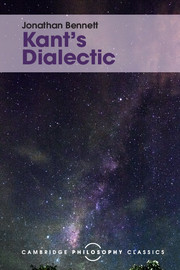Book contents
- Frontmatter
- Contents
- Preface to this edition by Karl Ameriks
- Preface
- System of references
- 1 Introduction
- 2 Concepts and intuitions
- 3 Substances and reality
- 4 The substantiality of the soul
- 5 The simplicity of the soul
- 6 The identity of the soul
- 7 Infinity
- 8 Limits
- 9 Divisibility
- 10 Freedom
- 11 God
- 12 Reason
- Index
- Frontmatter
- Contents
- Preface to this edition by Karl Ameriks
- Preface
- System of references
- 1 Introduction
- 2 Concepts and intuitions
- 3 Substances and reality
- 4 The substantiality of the soul
- 5 The simplicity of the soul
- 6 The identity of the soul
- 7 Infinity
- 8 Limits
- 9 Divisibility
- 10 Freedom
- 11 God
- 12 Reason
- Index
Summary
Simple substances
The second antinomy concerns divisibility. It pits the Thesis that every ‘composite substance’ has indivisible parts against the Antithesis that extended things cannot have indivisible parts. The reference to extension is essential: the divisibility of matter is being inferred from that of space, and Kant's occasional hints that the antinomy concerns the simplicity of the soul are just wrong.
In this section I shall discuss the Thesis-argument, the Antithesis-argument will be the topic of §53, and most of the remainder of the chapter will explore the conflict between them.
Deprived of its useless and confusing reductio ad absurdum form, the Thesis-argument goes as follows (462–4). From any composite substance ‘remove in thought all composition’, that is, think about its raw materials without any thought of how they are assembled to constitute the composite substance. As a crude analogy: one might ‘remove in thought all composition’ from a house by thinking of its constituent bricks – as a jumble, not as assembled in any particular fashion. But the analogy is crude, for a brick also has parts, so that if we had removed in thought all composition from a house we would not be thinking of ordinary space-taking bricks. Now, the argument continues, if upon removing in thought all composition from a composite substance we still have something to think about, some elements which are not themselves composed of anything still smaller, then those elements will be simple or non-composite or indivisible, and to that extent the Thesis will be satisfied. To complete the argument, then, Kant has only to rule out the possibility that when we remove in thought all composition from a composite substance there is nothing left for us to think about. In his own words, he has to show that it is always ‘possible to remove in thought all composition’ from a composite substance.
- Type
- Chapter
- Information
- Kant's Dialectic , pp. 165 - 185Publisher: Cambridge University PressPrint publication year: 2016

